Related Research Articles
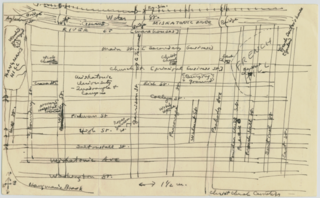
Arkham is a fictional city situated in Massachusetts. An integral part of the Lovecraft Country setting created by H. P. Lovecraft, Arkham is featured in many of his stories and those of other Cthulhu Mythos writers.

The Case of Charles Dexter Ward is a short horror novel by American writer H. P. Lovecraft, written in early 1927, but not published during the author's lifetime. Set in Lovecraft's hometown of Providence, Rhode Island, it was first published in the May and July issues of Weird Tales in 1941; the first complete publication was in Arkham House's Beyond the Wall of Sleep collection (1943). It is included in the Library of America volume of Lovecraft's work.
Weird fiction is a subgenre of speculative fiction originating in the late 19th and early 20th centuries. Weird fiction either eschews or radically reinterprets ghosts, vampires, werewolves, and other traditional antagonists of supernatural horror fiction. Writers on the subject of weird fiction, such as China Miéville, sometimes use "the tentacle" to represent this type of writing. The tentacle is a limb-type absent from most of the monsters of European folklore and gothic fiction, but often attached to the monstrous creatures created by weird fiction writers, such as William Hope Hodgson, M. R. James, Clark Ashton Smith, and H. P. Lovecraft. Weird fiction often attempts to inspire awe as well as fear in response to its fictional creations, causing commentators like Miéville to paraphrase Goethe in saying that weird fiction evokes a sense of the numinous. Although "weird fiction" has been chiefly used as a historical description for works through the 1930s, it experienced a resurgence in the 1980s and 1990s, under the label of New Weird, which continues into the 21st century.
Supernatural fiction or supernaturalist fiction is a genre of speculative fiction that exploits or is centered on supernatural themes, often contradicting naturalist assumptions of the real world.

The Main Street Museum is an eclectic display space for material culture and a civic organization in White River Junction, Vermont.

"Bennington Triangle" is a phrase coined by American author Joseph A. Citro to denote an area of southwestern Vermont within which a number of people went missing between 1945 and 1950. This was further popularized in two books, including Shadow Child, in which Citro devoted chapters to discussion of these disappearances and various items of folklore surrounding the area. According to Citro, the area shares characteristics with the Bridgewater Triangle in Southeastern Massachusetts.
Laird Samuel Barron is an American author and poet, much of whose work falls within the horror, noir, and dark fantasy genres. He has also been the managing editor of the online literary magazine Melic Review. He lives in Upstate New York.

Lovecraftian horror, sometimes used interchangeably with "cosmic horror", is a subgenre of horror fiction and weird fiction that emphasizes the horror of the unknowable and incomprehensible more than gore or other elements of shock. It is named after American author H. P. Lovecraft (1890–1937). His work emphasizes themes of cosmic dread, forbidden and dangerous knowledge, madness, non-human influences on humanity, religion and superstition, fate and inevitability, and the risks associated with scientific discoveries, which are now associated with Lovecraftian horror as a subgenre. The cosmic themes of Lovecraftian horror can also be found in other media, notably horror films, horror games, and comics.

The Whisperer in Darkness is a 26,000-word novella by American writer H. P. Lovecraft. Written February–September 1930, it was first published in Weird Tales, August 1931. Similar to The Colour Out of Space (1927), it is a blend of horror and science fiction. Although it makes numerous references to the Cthulhu Mythos, the story is not a central part of the mythos, but reflects a shift in Lovecraft's writing at this time towards science fiction. The story also introduces the Mi-Go, an extraterrestrial race of fungoid creatures.
Dark Twilight is a 1991 horror novel by author Joseph Citro. It tells the story of a writer-turned-paranormal investigator who has set out to examine the legendary lake monster of Lake Champlain.
The Vermont Ghost Guide is a comprehensive paranormal travel guide published in 2000 that documents all of the major hauntings and ghost-sightings in Vermont, inspired by the numerous Vermont wildlife and destination guides. The book was researched and written by Vermont folklore expert Joe Citro and illustrated by horror artist and fellow Vermonter Steve Bissette. The book is divided into sections, each devoted to a single region of Vermont and its supposed undead residents. Like his other non-fiction books, Citro does not speculate on whether or not the paranormal occurrences he describes are in fact true, but instead leaves that job entirely to the reader. However, as a joke, Citro did insert one account that was a complete fabrication, although he has never revealed which one that may be.
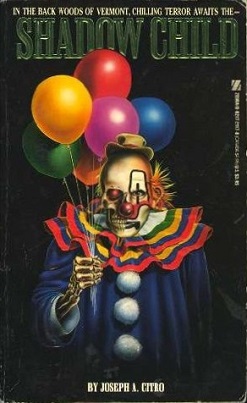
Shadow Child is a novel by American horror and paranormal folklore author Joseph A. Citro. It was originally published on July 1, 1987, before his novel Lake Monsters, but was republished by University Press of New England on September 1, 1998. The novel depicts the psychological and emotional impacts of mysterious disappearances and deaths.
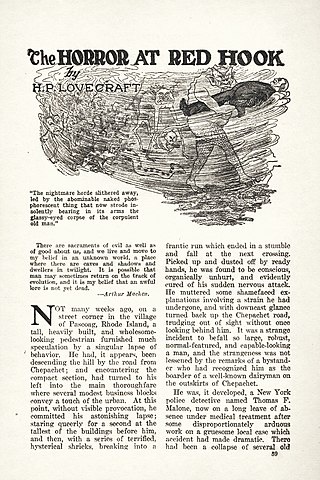
"The Horror at Red Hook" is a short story by American writer H. P. Lovecraft, written on August 1–2, 1925. "Red Hook" is a transitional tale, situated between the author's earlier work and the later Cthulhu Mythos. Although the story depicts a sinister cult, this cult offers a conventionally occult devil-worshipping threat, rather than the cosmic threat depicted in his later work. Living in poverty in the slum of Red Hook at the time of writing, Lovecraft was at this time urgently attempting to widen his markets in the pulp magazines. By having an unusually proactive Irish New York police detective as his protagonist, he hoped for a swift sale to a detective pulp, which would have opened up a new market other than his usual Weird Tales magazine. He did not get such a sale, and had to fall back on Weird Tales. "Red Hook" was thus first published in the January 1927 issue of Weird Tales.
Reggie Oliver is an English playwright, biographer and writer of ghost stories.

Out of Space and Time is a collection of fantasy, horror and science fiction short stories by American writer Clark Ashton Smith. It was released in 1942 and was the third book published by Arkham House. 1,054 copies were printed. A British hardcover appeared from Neville Spearman in 1971, with a two-volume paperback reprint following from Panther Books in 1974. Bison Books issued a trade paperback edition in 2006.
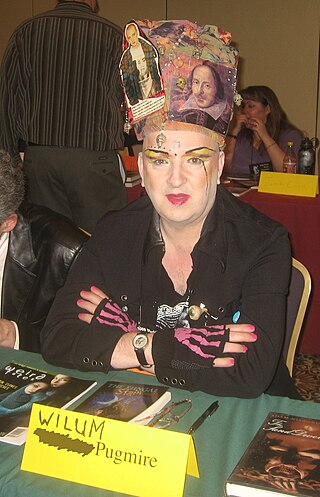
Wilum Hopfrog Pugmire, was a writer of weird fiction and horror fiction based in Seattle, Washington. His works typically were published as W. H. Pugmire and his fiction often paid homage to the lore of Lovecraftian horror. Lovecraft scholar and biographer S. T. Joshi described Pugmire as "the prose-poet of the horror/fantasy field; he may be the best prose-poet we have" and as one of the genre's leading Lovecraftian authors.

Stephen Jones is an English editor of horror anthologies, and the author of several book-length studies of horror and fantasy films as well as an account of H. P. Lovecraft's early British publications.
American gothic fiction is a subgenre of gothic fiction. Elements specific to American Gothic include: rationality versus the irrational, puritanism, guilt, the uncanny, ab-humans, ghosts, and monsters.

Jeffrey Andrew Weinstock is an American literature, film, and media scholar who has been teaching in the Department of English Language and Literature at Central Michigan University since 2001. He has authored or edited twenty-nine books and a range of articles focusing on the American Gothic tradition, monsters, cult film and television, popular culture, weird fiction, pedagogy, and goth music. He is the associate editor in charge of horror for the Los Angeles Review of Books.
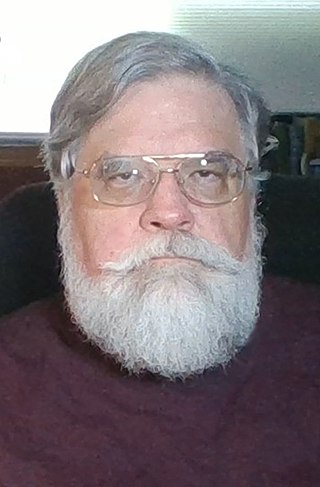
Robert Waldo Brunelle Jr., is an American painter, author, historian, and cartoonist. His visual art was compared in the Vermont newspaper the Brattleboro Reformer to Edward Hopper, with its "images of lonely and alienated individuals, which 'diverge from Hopper in their quirky sense of humor and saturated color." His comic strip, Mr. Brunelle Explains it All, features his takes on politics, current events, and social trends.
References
- 1 2 3 4 5 6 Daley, Yvonne (February 24, 1991). "Joseph Citro, Vermont's Own King of the Gothic Genre". Rutland Daily Herald. p. 50. Retrieved 22 October 2022.
- 1 2 3 4 5 Bolles, Dan (2020-10-28). "The Legend of Author and Folklorist Joe Citro - Books - Vermont's Independent Voice". Seven Days. Retrieved 2022-10-22.
- 1 2 "Windsor Author Joseph Citro is Still Writing, Telling Weird Tales". Valley News. 2016-10-24. Retrieved 2022-10-22.
- 1 2 3 MacKenzie, Melissa (April 4, 1999). "Joe Citro Mines his Dark Tales from Vermontiana". Rutland Daily Herald. Retrieved 22 October 2022.
- ↑ Daley, Yvonne (February 24, 1992). "Joseph Citro Bard of the Bizarre". Boston Globe. Retrieved 22 October 2022.
- ↑ Press Republican : Co-authors catalog region's weirdness Apr 25, 2003